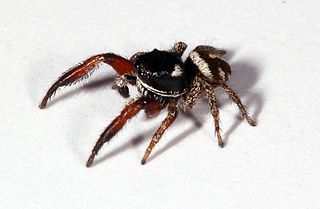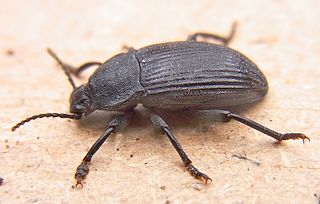Karl-Otto Koch was a mid-ranking commander in the Schutzstaffel (SS) of Nazi Germany who was the first commandant of the Nazi concentration camps at Buchenwald and Sachsenhausen. From September 1941 until August 1942, he served as the first commandant of the Majdanek concentration camp in occupied Poland, stealing vast amounts of valuables and money from murdered Jews. His wife, Ilse Koch, also participated in the crimes at Buchenwald.

Xysticus is a genus of ground crab spiders described by C. L. Koch in 1835, belonging to the order Araneae, family Thomisidae. The genus name is derived from the Ancient Greek root xyst, meaning "scraped, scraper".

Lithobius is a large genus of centipedes in the family Lithobiidae, commonly called stone centipedes, common centipedes or brown centipedes.

Icius is a genus of jumping spiders described by Eugène Simon in 1876, belonging to the Order Araneae, Family Salticidae.

Amblyomma is a genus of hard ticks. Some are disease vectors, for example the Rocky Mountain spotted fever in United States or ehrlichiosis in Brazil.

Epictia is a genus of snakes in the family Leptotyphlopidae. The genus is native to South America, Central America, and Mexico.

The Westphalian Museum of Natural History is a natural history museum in Münster, Germany.

Zygaena is a genus of moths in the family Zygaenidae. These brightly coloured, day-flying moths are native to the West Palearctic.

Didymictis is an extinct genus of placental mammals from extinct subfamily Didymictinae within extinct family Viverravidae, that lived in North America and Europe from the late Paleocene to middle Eocene.

Benthosuchus is an extinct genus of temnospondyl amphibian from the Early Triassic of Russia. It was primarily aquatic, living in rivers and lakes. Multiple species are known, with the largest reaching about 2.5 meters in length.

Bellastraea is a genus of sea snails, marine gastropod mollusks in the family Turbinidae, the turban snails.

The Micropeplinae are a subfamily of the Staphylinidae, rove beetles. Their antennae have 9 segments with single-segmented clubs. The tarsal formula is 4-4-4. They are found in leaf litter, near lake shores and marshy areas, in mammal and bird nests, probably as saprophages or mold feeders. In North America, two genera are known Kalissus LeConte 1874 and Micropeplus Latreille, with 14 widespread species.

Anoteropsis is a genus of wolf spiders. All the species except one are found in New Zealand and its islands.

Geophilus is a large, heterogeneous genus of soil centipedes in the family Geophilidae largely considered to be synonymous with Brachygeophilus. The generic name first appeared in Brewster's Edinburgh Encyclopaedia in 1814 as Geophilus electricus. This genus has a Holarctic distribution.

Pellenes nigrociliatus is a jumping spider species in the genus Pellenes.

Bomis is a genus of very small crab spiders, first described by German arachnologist Ludwig Carl Christian Koch in 1874. Five species are currently described, with three species from India and two from Australia.

Dendarus is a genus of darkling beetles in the family Tenebrionidae. The genus is distributed from Morocco to Caucasus and exhibits a high level of diversity with 36 species, 27 of which are island endemics. Analyses of the phylogenetic relationships of 23 species from Greece and Turkey revealed 13 distinct lineages with several para- and polyphyletic cases corresponding to three major phylogroups [south/south-east Aegean ; central to north Aegean, Turkey and mainland Greece and mainland Greece ].
Atractides is a genus of mites belonging to the family Hygrobatidae.

Bryobia graminum, also known as the clover mite, is a species of mite with a cosmopolitan distribution.
Maria Tonelli-Rondelli was an Italian entomologist who studied the taxonomy and identification of ticks (Ixodidae), especially South American species.
















